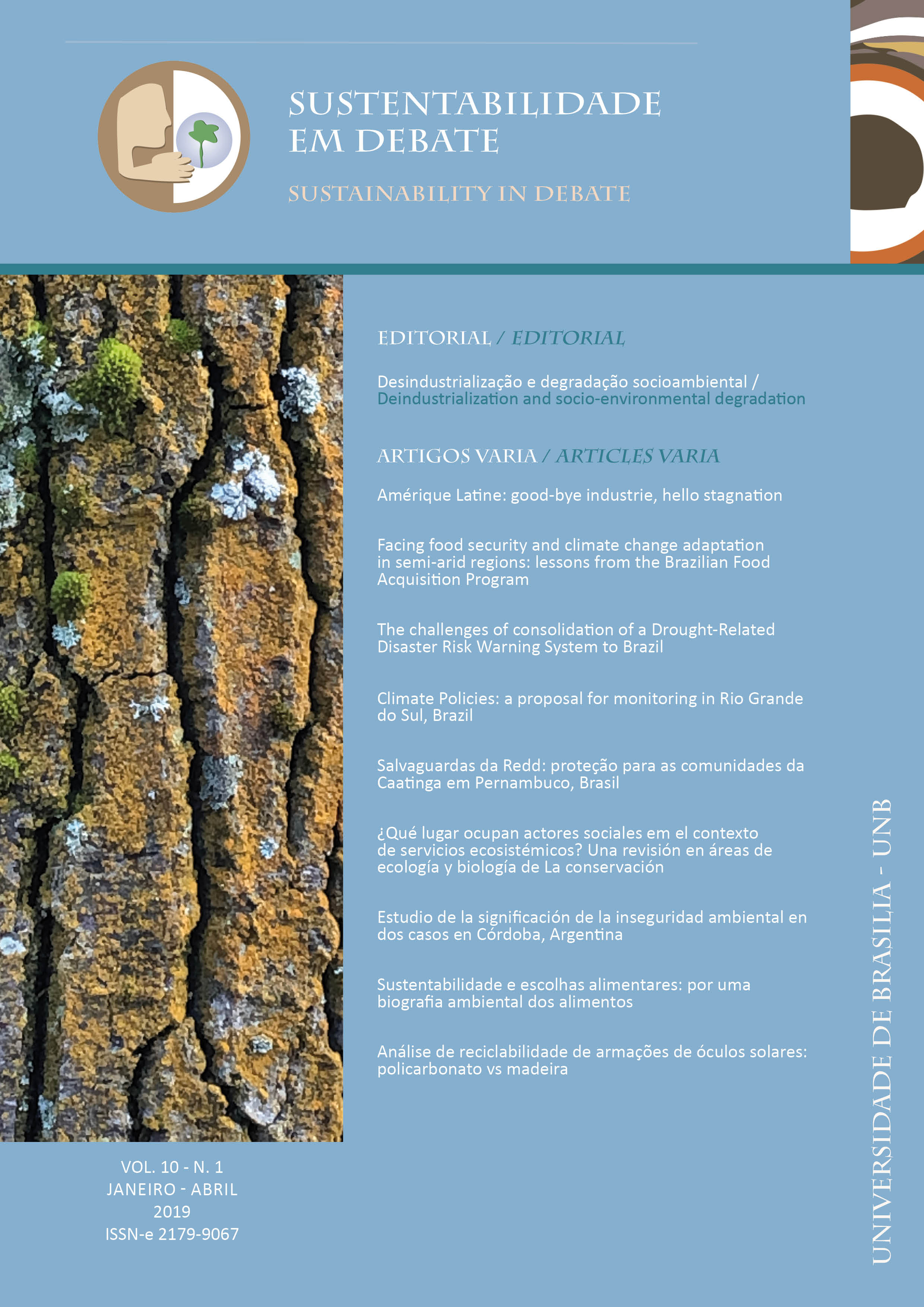Análise de reciclabilidade de armações de óculos solares: policarbonato vs madeira
DOI:
https://doi.org/10.18472/SustDeb.v10n1.2019.20161Palabras clave:
Óculos solares; Madeira; Policarbonato; Fim de Ciclo de Vida; Reciclabilidade; Sustentabilidade.Resumen
Os óculos solares surgiram após a Primeira Guerra Mundial e, desde então, são utilizados por grande parte da população como um acessório e como proteção para os olhos. Para investigar o final do ciclo de vida desse produto, elaborou-se um questionário virtual, obtendo-se 765 respostas; complementarmente foram realizadas entrevistas em óticas, lojas especializadas e oficinas de reparos da cidade de Porto Alegre (Brasil). De acordo com os dados coletados, foram selecionados dois óculos solares: modelo A, de polímero termoplástico, e modelo B, de madeira, visando analisar o potencial de reciclabilidade desses produtos. As armações dos modelos foram analisadas sob ótica do design orientado para a desmontagem (DfD) e para a reciclagem (DfR). Foi necessária caracterização de materiais de componentes do modelo A por técnica de FT-IR. As análises apontam que a armação do modelo A, de policarbonato, tem menor impacto na desmontagem, separação e reaproveitamento dos materiais pela indústria de reciclagem mecânica. Apesar de o modelo B ter materiais de origem renovável (madeira), a fabricação da armação por prensagem com resina epóxi compromete a separação dos materiais pós-consumo. Nesse caso, indica-se seu reaproveitamento por reciclagem energética.
Descargas
Descargas
Publicado
Cómo citar
Número
Sección
Licencia
Derechos de autor 2019 Sustentabilidade em Debate

Esta obra está bajo una licencia internacional Creative Commons Atribución-NoComercial-SinDerivadas 4.0.
La presentación de la(s) obra(s) científica(s) original(es) por parte de los autores, como titulares de los derechos de autor de los textos enviados a la revista, de conformidad con la Ley 9.610/98, implica la cesión de derechos de autor de publicaciones impresas y/o digitales a la Revista de Sustenibilidad en Debate de los artículos aprobados para fines de publicación, en un único número de la Revista, autorizando también que la(s) obra(s) científica(s) aprobada(s) se divulguen de forma gratuita, sin ningún tipo de reembolso de derechos de autor, a través del sitio web de a Revista, para leer, imprimir y/o descargar el archivo de texto, a partir de la fecha de aceptación para publicación. Por lo tanto, los autores, al presentar los artículos a la Revista y, en consecuencia, la libre cesión de derechos de autor relacionados con el trabajo científico presentado, son plenamente conscientes de que no serán remunerados por la publicación de los artículos en la revista.Â
La Revista está licenciada bajo una licencia no comercial y sin derivaciones Creative Commons (No permite la realización de obras derivadas) 3.0 Brasil, con el propósito de difundir conocimientos científicos, como se indica en el sitio web de la publicación, que permite el intercambio del texto y el reconocimiento de su autoría y publicación original en esta revista.
Los autores pueden asumir contratos adicionales por separado, para la distribución no exclusiva de las obras publicadas en la revista Sustenibilidad en Debate (por ejemplo, en un capítulo de libro), siempre que se indique que los textos se publicaron originalmente en esta revista y que se menciona el DOI correspondiente. Se permite y incentiva a los autores a publicar y distribuir su texto online después de su publicación (por ejemplo, en repositorios institucionales o en sus páginas personales).Â
Los autores aceptan expresamente los términos de esta Declaración de Derechos de Autor, que se aplicará a la presentación si es publicada por esta Revista.









